Treatment innovation for mental health: drawing on mental imagery
Mental health
Even the best treatments in mental health require improvement. We believe therapy development can increasingly benefit from psychological science via targeting those thought processes that 1) worsen psychological symptoms 2) improve wellbeing.
Mental Imagery
An area in cognitive science that presents exciting opportunities for improving mental health concerns “mental imagery” (e.g. ‘seeing in the mind’s eye’, ‘hearing in the mind’s ear’). We use mental imagery all the time, for example in remembering the past or thinking about the future. However mental imagery has a powerful impact on our emotions, and can play an important (yet often neglected) role in emotional disorders (1).
Emotional mental images can be problematic when they are negative. We use the term “flashbacks” to refer to distressing images that spring to mind unbidden, such as past memories of trauma. Images can also be ‘flash-forwards’ to the future – a term we have coined in relation to suicidal thinking and to bipolar disorder (2). On the other hand, when mental imagery is positive and more under our control, it can be helpful.
An example: using positive mental imagery in the face of ambiguity – application to depression.
What are we investigating?
To date treatments in depression have focussed on negative thinking styles, what has happened in the past, and our verbal thoughts. While these are important, we have become curious about other cognitive processes that have been relatively neglected: such as how we imagine positive events in the future. When people are depressed they often struggle to imagine positive or benign possibilities in their future, making it difficult to be optimistic (3)
How are we researching this?
We started with a series of laboratory studies, first in healthy volunteers and then with people with mild depressed mood. Finally we began to test how to translate the technique developed in the laboratory with a series of patients with clinical depression, talking to each person in detail (4). Next we moved to a small trial comparing two groups of patients (5). We are now moving this work to the next step in translation in a larger scale randomised clinical trial.
Can people with depression boost their tendency to imagine positive events in the future?
The intervention we are developing uses computerised training exercises. In one such training exercise, people practise using everyday scenes as springboard for more positive mental images. The scene below (Figure 1) could easily be seen as indicating a huge traffic jam up ahead (Figure 2). However, in the training it would be used to provide a springboard for a positive mental image of a smooth journey ahead (Figure 3).

Why might this be useful?
The world around us is inherently ambiguous, and over the course of a day we will encounter many situations or events that could turn out in different ways. These small habits of thoughts in our daily lives can therefore add up to have a significant effect on our mood and what we do. If our imaginations guide how we react to the world then it may be very helpful to boost how readily someone can imagine events turning out ok. Overall, we hope that we can harness properties of mental imagery in new treatments to improve mental health and wellbeing.
Example references
1. Holmes EA, Mathews A. Mental imagery in emotion and emotional disorders. Clinical Psychology Review. 2010;30(3):349-62.
2. Di Simplicio M, Attenburrow M, Goodwin GM, Holmes EA. Revealing the mind’s eye: Bringing (mental) images into psychiatry. American Journal of Psychiatry, 169(12):1245-6.
3. Blackwell SE, Rius-Ottenheim N, Schulte-van Maaren YWM, Carlier IVE, Middelkoop VD, Zitman FG, et al. Optimism and mental imagery: a possible modifiable cognitive marker to promote wellbeing? Psychiatry Research. in press.
4. Blackwell SE, Holmes EA. Modifying interpretation and imagination in clinical depression: a single case series using cognitive bias modification. Applied Cognitive Psychology. 2010;24(3):338-50.
5. Lang TJ, Blackwell SE, Harmer C, Davison P, Holmes EA. Cognitive bias modification using mental imagery for depression: developing a novel computerized intervention to change negative thinking styles. European Journal of Personality. 2012;26:145-57.

 MRC Cognition and Brain Sciences Unit
MRC Cognition and Brain Sciences Unit

